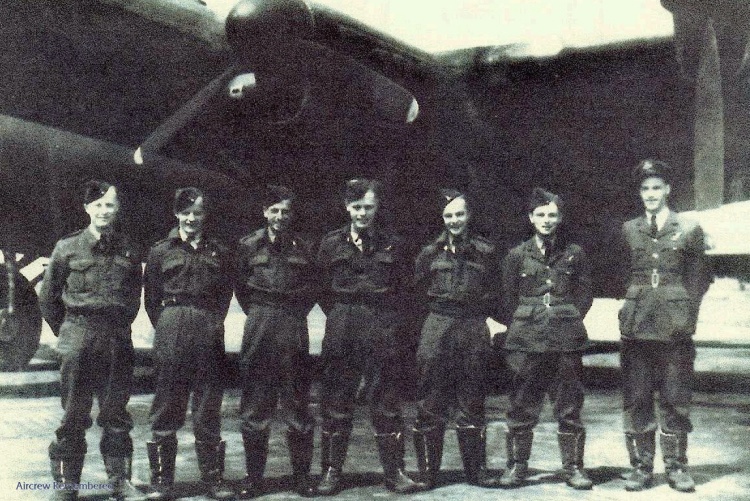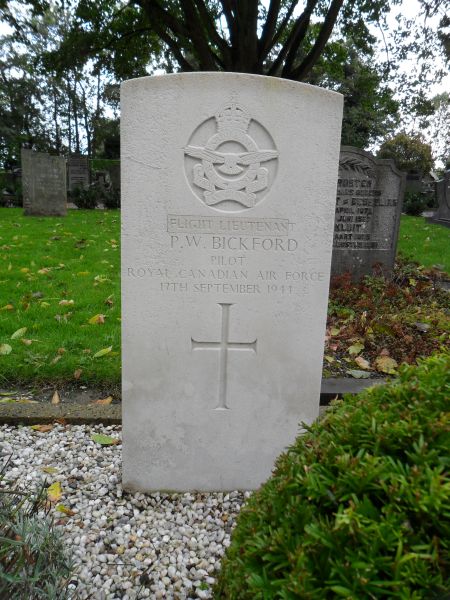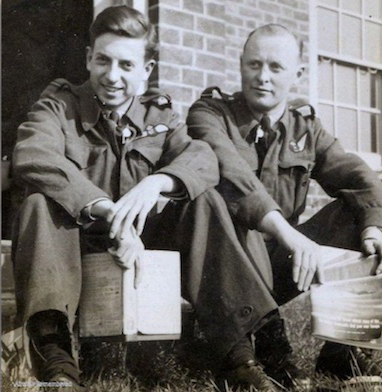Market Garden Profile of Courage: Flight Lieutenant Peter William Bickford
News Article / August 30, 2019
Click on the photo under “Image Gallery” to see more photos.
By Major (retired) William March
2019 marks the 75th anniversary of Operation Market Garden, the audacious and ultimately unsuccessful push
to secure bridges over several rivers in Holland and thus open a corridor through which the Allied ground forces
could sweep, with the goal of ending the war by Christmas 1944.
Flight Lieutenant Peter William Bickford was rejected by the American military because he was a British citizen. So he came north to join the Royal Canadian Air Force, and eventually found himself in the thick of the action during Operation Market Garden.
Peter was born in Bristol, England, on July 16, 1920. His family immigrated to North America in 1925 and ten years later settled in Monongahela, Pennsylvania.
He graduated from the Monongahela High School in 1939 and became a sports editor for the local newspaper, The Daily Republican. In his spare time, he took courses at the Pittsburgh Institute of Aeronautics.
In the months following the Japanese attack on American forces at Pearl Harbour, Hawaii, on December 7, 1941, he attempted to enlist in the United States Army, planning to become a flyer. However, he was a British citizen and was turned down. He then travelled to Toronto in April 1942 and was welcomed with open arms into the Royal Canadian Air Force. Selected to become a pilot, he undertook basic flying training at No. 13 Elementary Flying Training School, St. Eugene, Ontario, on the Fleet Finch. From there he proceeded to No. 8 Service Flying Training School, Moncton, New Brunswick, on Avro Ansons. After receiving his pilot wings in May 1943, newly-promoted Pilot Officer Bickford proceeded overseas to England.
After advance training at No. 12 Operational Training Unit, Royal Air Force Station Edgehill, Oxfordshire, and No. 1657 Heavy Conversion Unit, RAF Station Chedburgh, Suffolk, he was posted to 115 Squadron in June 1944. Operating out of RAF Station Witchford, Cambridgeshire, the squadron was part of No. 3 Group, RAF Bomber Command and equipped with four-engine Avro Lancaster bombers.
Bickford and his crew flew their first mission on June 14 in support of the Normandy campaign. Over the next several months they conducted more than 25 missions throughout occupied France and Germany; although many of their comrades on the squadron lost their lives, he and his crew came through unscathed. Yet, the every-present stress of operations and the constant loss of friends affected Bickford and he confided as much in a letter written on July 19 to his mentor and friend at The Daily Republican, Floyd M. France.
Death no longer seems to me the strange and forbidding thing that it once was. Yet even now, though I see it so frequently, I must still ponder its ‘cause and effect,’ and its real necessity, for it seems too often to claim the very best of men.
I have noticed this consistently: that those whom I like and admire most are the very ones to go. I sometimes find it hard, in the light of this, to acknowledge the unfailing ‘benevolence of God.’ But it’s convinced me of one thing, at least—that God (and I think He must exist in some manner) chooses his new companions with a discriminating eye.
Death is of course no hardship to the one it claims, and if we could but look at it through His eyes we would see little cause for sadness. Certainly, those in this service who think about the matter fear much less for themselves than for the pain their deaths will cause others. But we mortals, being by nature a selfish lot, must grieve; and it seems to me that when we do, we grieve chiefly for our own loss – not really for the one who has gone.
I, myself, have asked ‘why?’ many times now, and just as often found no answer. At any rate I must believe that life and death are more than accidents – that nothing is created without a purpose … some object in some greater master plan.
Late in the evening of September 16, 1944, Bickford—now holding the rank of flight lieutenant—and his crew in Lancaster LM 693 (KO-T) took off from Witchford with 11 other aircraft from 115 Squadron. They were part of a 54-aircraft attack in support of Operation Market Garden, an aggressive combined airborne and armoured thrust into occupied Holland. Their targets were German flak positions defending the bridge near the Dutch town of Moerdijk.
It was the first night of Operation Market Garden and Flight Lieutenant Bickford’s 29th mission. He was one mission short of completing a 30-mission tour of duty.
Enemy flak was light, but the skies are crowded as the aerial armada drop their high-explosive cargos. Flight Lieutenant Bickford successfully completed his attack but during the climb away from the target area his Lancaster collided with an aircraft crewed by members of the RAF from 90 Squadron. The crews of both aircraft perished; they were the only losses incurred during the mission. None of the German targets were hit during the attack.
Flight Lieutenant Bruce Johnson, another RCAF pilot with 115 Squadron noted the loss in his diary: “Not a great deal of opposition but we lost Bickford and crew on it. Came as a bit of a shock to us! Saw a chop [slang for an aircraft loss] right at the target which must have been Bick. At the time I thought it was a bit big for a chop—but I guess it wasn’t.”
Along with Flight Lieutenant Bickford, Flying Officer Wilfrid George Scanlan (bomb aimer, 22, Westport, Ontario), Flying Officer Arnold Ney Johnston (navigator, 28, Burketon, Ontario), Pilot Officer Douglas Dawson (air gunner, 23, Cookstown, Ontario), Pilot Officer Donald George Flood (air gunner, 20, Woodstock, Ontario) and two members of the RAF—Pilot Officer P.L. Dooley (flight engineer) and Flight Sergeant U.B. Butters (wireless operator)—were killed.
They are buried in the Strijen Protestant Cemetery in Strijen, Holland.
Flight Lieutenant Bickford was 24.



